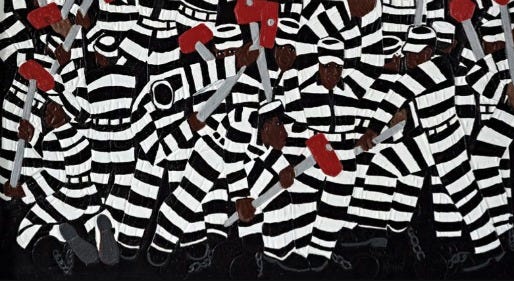All Me: The Life and Times of Winfred Rembert
"All Me" tells the tale of African American folk artist Winfred Rembert. It's a good film, buoyed by the Rembert's natural storytelling abilities, but weakened somewhat by narrative decisions made by the filmmakers.

The skinny: Rembert was born in the 1940's and faced many of the challenges known to African Americans during the Civil Rights movement. He was raised impoverished, worked slave-like jobs, and was eventually imprisoned by the twisted whims of a prejudice court. While in prison, Rembert learned how to leather craft. After prison, he married his sweetheart and they moved North, siring eight children. All the while, Rembert made a living with leatherwork. Years later his wife encouraged him to craft large tapestries depicting moments in his life. His art has landed him a position at Yale University and national acclaim.
Rembert is a fantastic storyteller. He could make a walk to the mailbox into a tall tale, His story about meeting his wife is one for the ages. He was a prisoner, working on the chain gang behind her farm. He chased her heart; her father chased him off with a shotgun. Eventually years of love letters won her heart, and they married upon his release. To hear Rembert tell it is to see the scene unfold, despite the stock b-roll on the screen.
Watching Rembert construct his art is also a highlight of the film. Using a small pin, he pounds shapes and pictures into leather swatches. Then he dyes them using a paint brush, bit by bit. It looks tedious, and his final products are a wonderful sight to behold. His artistic process doesn't receive nearly as much focus as it should in the film.
I do have one problem with the film, and that is with how the the film makers chose to tell Rembert's story. "All Me" introduces his wife before covering how he ended up in prison, or even his early childhood. His patrons are introduced before we actually see him developing his art style. While we leave the film with an understanding of Rembert, we're not given much of an emotional through-line. It feels like a survey rather than a story.
In a way, the film's lack of narrative muddles its purpose. Rembert's life was terribly tragic, an example of what many African Americans had to endure in the deep south during the 1960's. But we aren't shown that story upfront. It's scattered around scenes of Rembert returning home, scenes of Rembert's family reminiscing. It's a great story, an important story, told in a not-so-great way.


